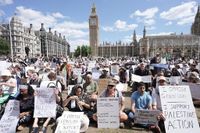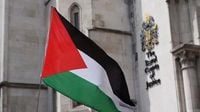On August 9, 2025, the heart of London’s Parliament Square became the unlikely epicenter of a sweeping clash between government anti-terrorism policy and the right to protest, as 532 people—many of them older citizens—were arrested for publicly supporting the recently proscribed group, Palestine Action. The mass detentions, carried out by Metropolitan Police under Section 13 of the Terrorism Act 2000, have ignited a fierce national debate about freedom of expression, the definition of terrorism, and the United Kingdom’s role in the ongoing conflict in Gaza.
The protest, organized by Defend Our Juries, unfolded with hundreds of demonstrators simultaneously raising placards at 1:00 pm, each sign reading, “I oppose genocide: I support Palestine Action.” Their message was twofold: to call for an end to what they described as genocide in Gaza, and to oppose Home Secretary Yvette Cooper’s decision to ban Palestine Action as a terrorist organization. The government’s move, enacted just a month earlier, made membership of or support for the group a criminal offense, punishable by up to 14 years in prison.
Among those arrested was Jonathon Porritt, a former environmental adviser to King Charles and noted campaigner. Reflecting on the surreal nature of his arrest, Porritt described the scene in Parliament Square as “predominantly old or middle-aged, middle-class citizens” being treated as if they were members of notorious terrorist groups. “Shame, primarily, on our government,” Porritt wrote, arguing that the real disgrace lies with ministers he believes are complicit in the crisis in Gaza through continued arms sales to Israel and a refusal to act on international legal duties to prevent genocide.
The government, however, stands firm in its position. Home Secretary Cooper has repeatedly defended the proscription, insisting that “no-one is in any doubt that this is not a non-violent organisation.” She cited “clear security assessments and advice” from the Joint Terrorism Analysis Centre (JTAC), which, according to government statements, found that Palestine Action had committed three separate acts of terrorism, including “violent attacks” and “major criminal damage against national security infrastructure.” Among the incidents cited was the group’s claim of responsibility for an estimated £7 million in damage to jets at RAF Brize Norton earlier this year.
Yet, the evidence underpinning this designation remains largely undisclosed, with Cooper and other officials pointing to ongoing prosecutions and national security concerns as reasons for withholding specifics. “There may be people who are objecting to proscription who don’t know the full nature of this organisation, because of court restrictions on reporting while serious prosecutions are under way,” Cooper told the BBC. She emphasized that while tens of thousands have protested lawfully about the “horrendous events” in Gaza, Palestine Action’s methods—particularly its direct actions and alleged violence—cross a line the government cannot ignore.
Critics, however, are not convinced. Civil liberties groups, including Amnesty International and Liberty, have condemned the arrests as “disproportionate to the point of absurdity.” Sacha Deshmukh, Amnesty’s chief executive, stated, “Peaceful protest is a fundamental right. People are understandably outraged by the ongoing genocide being committed in Gaza and are entitled under international human rights law to express their horror.” He added, “We have long criticised UK terrorism law for being excessively broad and vaguely worded and a threat to freedom of expression. These arrests demonstrate that our concerns were justified.”
Liberty’s director of external relations, Sam Grant, echoed this sentiment, saying, “The scenes we saw over the weekend of mass arrests at public protests are deeply concerning. That hundreds of people were arrested under these powers further highlights the dangerous breadth and vagueness of the UK’s anti-terrorism laws. Conflating protest activity with terrorism rightly has the general public scratching their heads.”
The political backlash has been swift and bipartisan. Labour peer Shami Chakrabarti warned that the proscription of Palestine Action risked becoming “a mistake of poll tax proportions”—a nod to the infamous policy that sparked mass unrest in the 1990s. Conservative former cabinet minister Sir David Davis called the arrests an “excessive use of counterterrorism law,” questioning the criteria for proscribing the group and asking, “Should you be arresting lots of people because they support a particular side and put up a banner?” Veteran MP Diane Abbott suggested the government risked appearing “both draconian and foolish,” while former Labour minister Peter Hain described the mass arrests as “madness.”
Adding to the complexity, many of those arrested were over the age of 60, a detail that has not gone unnoticed by observers and politicians alike. “The notable presence of so many older people highlights the strength of genuine feeling,” Chakrabarti observed, arguing that criminal damage at air force bases can and should be prosecuted, but “sweeping guilt by association only exacerbates community tensions and creates a bigger headache for the police.”
Police themselves have been placed in a challenging position. Prior to the protest, they warned that anyone expressing support for Palestine Action would be detained. Most of those arrested were reportedly given street bail and allowed to go home, which Palestine Action co-founder Huda Ammori claimed demonstrated the “unenforceable” nature of the current ban. Nazir Afzal, a former top prosecutor, cautioned that prosecuting the arrested protesters would be “a terrific waste of time,” predicting that “no jury would convict anyhow.”
For the government, the stakes are high. Ministers insist that supporters of Palestine Action “will feel the full force of the law.” Victims minister Alex Davies-Jones stated, “Palestine Action violently carried out criminal damage to RAF aircraft [and] we have credible reports of them targeting Jewish-owned businesses here in the United Kingdom, and there are other reasons, which we can’t disclose because of national security.” She added, “But they are a proscribed terrorist organisation and anyone showing support for that terrorist organisation will feel the full force of the law.”
The broader context of the protest is the ongoing violence in Gaza. Since Israel’s offensive began in response to the Hamas-led attack on October 7, 2023, the Gaza health ministry reports that 61,430 people have been killed. The United Nations continues to warn that humanitarian aid entering Gaza is “far below the minimum required to meet people’s immense needs,” and global food security experts now say the “worst-case scenario of famine is currently playing out.”
Prime Minister Sir Keir Starmer has sought to address the crisis by warning Israel that the UK will recognize a Palestinian state in September unless “substantive steps” are taken to end the “appalling situation in Gaza.” Israel, for its part, has strongly criticized this stance, arguing that it “rewards Hamas’s monstrous terrorism.”
As the legal battle over the proscription of Palestine Action moves to the High Court in November, the events of August 9 have already left an indelible mark on the national consciousness. Whether the government’s approach will be vindicated or condemned remains to be seen, but for now, the question of where to draw the line between protest and terrorism is more urgent—and more contested—than ever.



